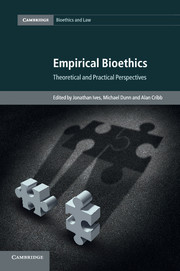Book contents
- Empirical BioethicsTheoretical and Practical Perspectives
- Cambridge Bioethics and Law
- Empirical Bioethics
- Copyright page
- Contents
- Contributors
- Preface
- Acknowledgements
- Part I Theoretical Perspectives
- Part II Practical Perspectives
- 8 Practical Perspectives: An Introduction
- 9 Moral Improvement through Interactive Research: A Practice Example of Dialogical Empirical Bioethics
- 10 Reflective Equilibrium as a Normative Empirical Model: The Case of Ashley X
- 11 Theory and Practice of Democratic Deliberation in Bioethics Research
- 12 Feminist Empirical Bioethics
- 13 Lessons from Experience: Establishing and Running Interdisciplinary Mixed-Method Bioethics Research
- 14 Publishing Research in Empirical Bioethics: Quality, Disciplines and Expertise
- Index
- Books in the series
- References
12 - Feminist Empirical Bioethics
from Part II - Practical Perspectives
Published online by Cambridge University Press: 23 February 2017
- Empirical BioethicsTheoretical and Practical Perspectives
- Cambridge Bioethics and Law
- Empirical Bioethics
- Copyright page
- Contents
- Contributors
- Preface
- Acknowledgements
- Part I Theoretical Perspectives
- Part II Practical Perspectives
- 8 Practical Perspectives: An Introduction
- 9 Moral Improvement through Interactive Research: A Practice Example of Dialogical Empirical Bioethics
- 10 Reflective Equilibrium as a Normative Empirical Model: The Case of Ashley X
- 11 Theory and Practice of Democratic Deliberation in Bioethics Research
- 12 Feminist Empirical Bioethics
- 13 Lessons from Experience: Establishing and Running Interdisciplinary Mixed-Method Bioethics Research
- 14 Publishing Research in Empirical Bioethics: Quality, Disciplines and Expertise
- Index
- Books in the series
- References
- Type
- Chapter
- Information
- Empirical BioethicsTheoretical and Practical Perspectives, pp. 195 - 221Publisher: Cambridge University PressPrint publication year: 2016
References
- 13
- Cited by



